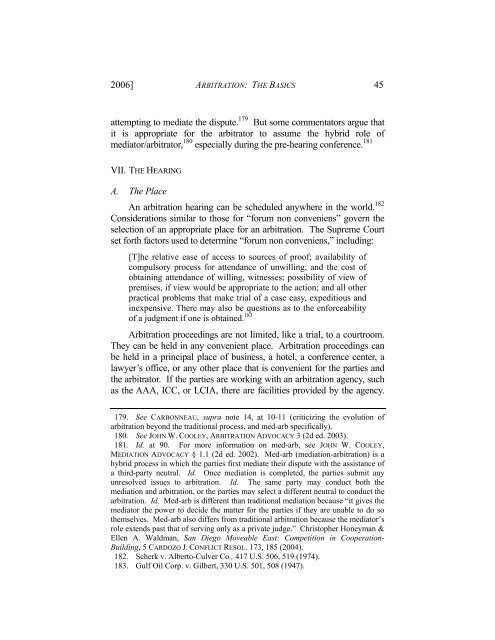2006/Vol. 5 No.1 - Hamline Law - Hamline University
2006/Vol. 5 No.1 - Hamline Law - Hamline University
2006/Vol. 5 No.1 - Hamline Law - Hamline University
You also want an ePaper? Increase the reach of your titles
YUMPU automatically turns print PDFs into web optimized ePapers that Google loves.
<strong>2006</strong>] ARBITRATION: THE BASICS 45<br />
attempting to mediate the dispute. 179 But some commentators argue that<br />
it is appropriate for the arbitrator to assume the hybrid role of<br />
mediator/arbitrator, 180 especially during the pre-hearing conference. 181<br />
VII. THE HEARING<br />
A. The Place<br />
An arbitration hearing can be scheduled anywhere in the world. 182<br />
Considerations similar to those for “forum non conveniens” govern the<br />
selection of an appropriate place for an arbitration. The Supreme Court<br />
set forth factors used to determine “forum non conveniens,” including:<br />
[T]he relative ease of access to sources of proof; availability of<br />
compulsory process for attendance of unwilling, and the cost of<br />
obtaining attendance of willing, witnesses; possibility of view of<br />
premises, if view would be appropriate to the action; and all other<br />
practical problems that make trial of a case easy, expeditious and<br />
inexpensive. There may also be questions as to the enforceability<br />
of a judgment if one is obtained. 183<br />
Arbitration proceedings are not limited, like a trial, to a courtroom.<br />
They can be held in any convenient place. Arbitration proceedings can<br />
be held in a principal place of business, a hotel, a conference center, a<br />
lawyer’s office, or any other place that is convenient for the parties and<br />
the arbitrator. If the parties are working with an arbitration agency, such<br />
as the AAA, ICC, or LCIA, there are facilities provided by the agency.<br />
179. See CARBONNEAU, supra note 14, at 10-11 (criticizing the evolution of<br />
arbitration beyond the traditional process, and med-arb specifically).<br />
180. See JOHN W. COOLEY, ARBITRATION ADVOCACY 3 (2d ed. 2003).<br />
181. Id. at 90. For more information on med-arb, see JOHN W. COOLEY,<br />
MEDIATION ADVOCACY § 1.1 (2d ed. 2002). Med-arb (mediation-arbitration) is a<br />
hybrid process in which the parties first mediate their dispute with the assistance of<br />
a third-party neutral. Id. Once mediation is completed, the parties submit any<br />
unresolved issues to arbitration. Id. The same party may conduct both the<br />
mediation and arbitration, or the parties may select a different neutral to conduct the<br />
arbitration. Id. Med-arb is different than traditional mediation because “it gives the<br />
mediator the power to decide the matter for the parties if they are unable to do so<br />
themselves. Med-arb also differs from traditional arbitration because the mediator’s<br />
role extends past that of serving only as a private judge.” Christopher Honeyman &<br />
Ellen A. Waldman, San Diego Moveable East: Competition in Cooperation-<br />
Building, 5 CARDOZO J. CONFLICT RESOL. 173, 185 (2004).<br />
182. Scherk v. Alberto-Culver Co., 417 U.S. 506, 519 (1974).<br />
183. Gulf Oil Corp. v. Gilbert, 330 U.S. 501, 508 (1947).
















